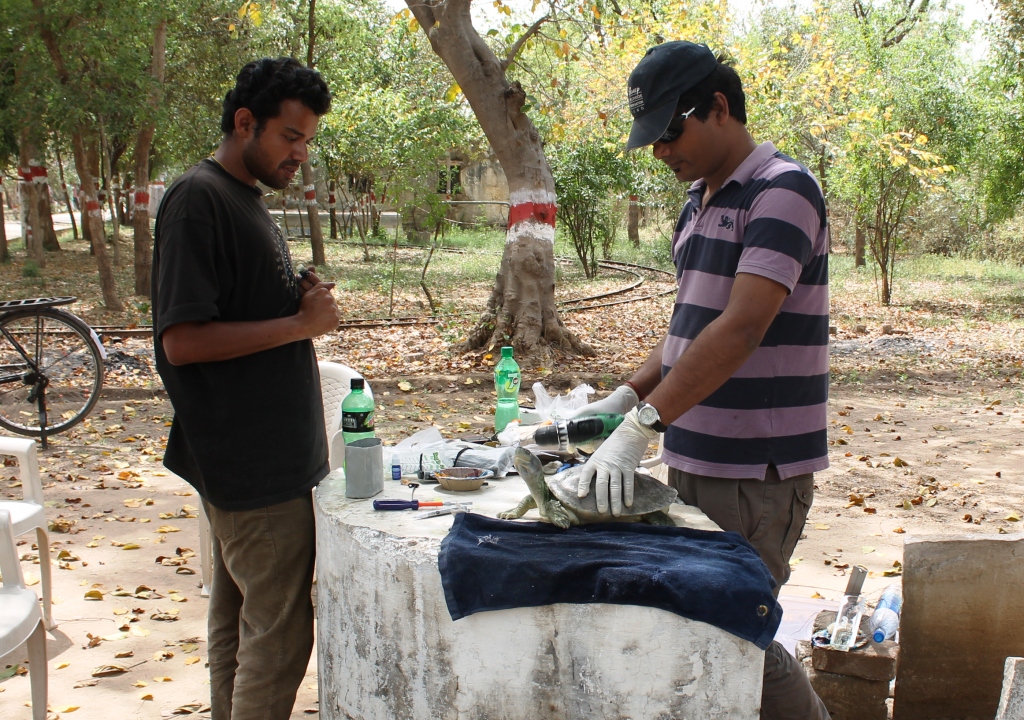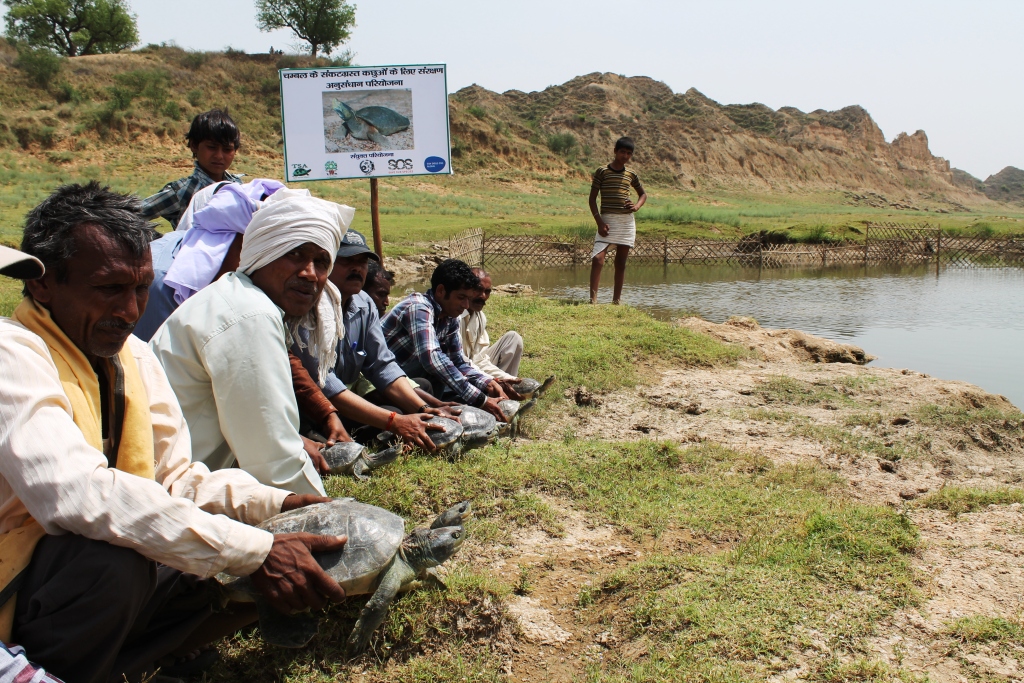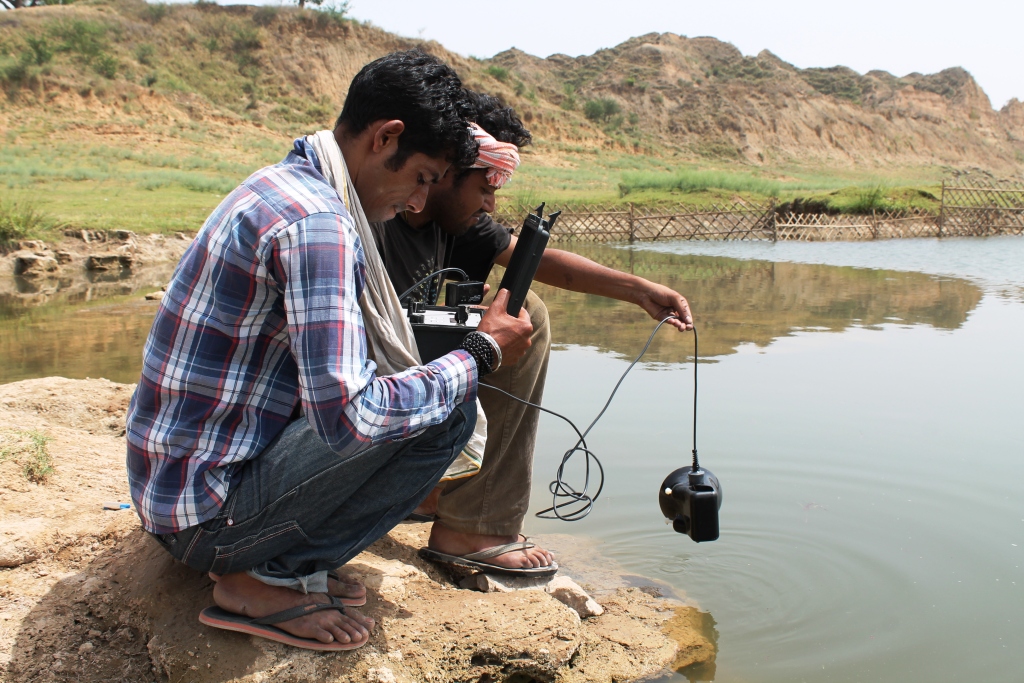Headstarted Turtles Released in India
by Heather Lowe 
 TSA India, in cooperation with the Madras Crocodile Bank Trust (MCBT) and the Madhya Pradesh Forest Department (MPFD), operates a headstart facility for the Red-Crowned Roof Turtle (Batagur kachuga) in Morena known as the Deori Eco-Centre. The headstarting program, which has been in operation for about 9 years, aims to enhance natural recruitment in endangered populations by raising hatchlings in captivity until they reach a size at which their chance of predation is reduced, thereby increasing long-term survival.
TSA India, in cooperation with the Madras Crocodile Bank Trust (MCBT) and the Madhya Pradesh Forest Department (MPFD), operates a headstart facility for the Red-Crowned Roof Turtle (Batagur kachuga) in Morena known as the Deori Eco-Centre. The headstarting program, which has been in operation for about 9 years, aims to enhance natural recruitment in endangered populations by raising hatchlings in captivity until they reach a size at which their chance of predation is reduced, thereby increasing long-term survival.
 In order to measure the efficacy of headstarting as a means of species recovery, it is critical that the influence of captive rearing on survival and dispersal be assessed. Telemetry studies, in which the animals can be tracked, are typically an effective tool to monitor released animals. In April 2013, ten turtles (four males and six females) were selected for release from the headstart group. The individuals selected hatched in either 2004 or 2005.
In order to measure the efficacy of headstarting as a means of species recovery, it is critical that the influence of captive rearing on survival and dispersal be assessed. Telemetry studies, in which the animals can be tracked, are typically an effective tool to monitor released animals. In April 2013, ten turtles (four males and six females) were selected for release from the headstart group. The individuals selected hatched in either 2004 or 2005.
 After their health was assessed, transmitters were attached and the animals were observed overnight to be sure that the transmitters did not have any adverse effects on the turtles' movement or behavior. Once it was determined that they were ready for release, the turtles were transported to the Chambal River and placed into soft-release pens that had been built over the river. The use of soft-relase pens gives biologists a chance to monitor the animals in a "wild" setting, and provide food or other support if needed, while they adjust to their new home.
After their health was assessed, transmitters were attached and the animals were observed overnight to be sure that the transmitters did not have any adverse effects on the turtles' movement or behavior. Once it was determined that they were ready for release, the turtles were transported to the Chambal River and placed into soft-release pens that had been built over the river. The use of soft-relase pens gives biologists a chance to monitor the animals in a "wild" setting, and provide food or other support if needed, while they adjust to their new home.
The animals were monitored at dawn and dusk to minimize disturbance and after two weeks, the soft release pens were dismantled and the turtles were released. Monitoring will continue throughout the summer to determine survival rates, dispersal and even potential reproductive success. We are hopeful that the released individuals will thrive and contribute to the health of the wild population of this critically endangered species.
TSA would like to thank the Madhya Pradesh Forest Department Officers- especially Principal Chief Conservator of Forests (Wildlife), Mr. Suhas Kumar,IFS Additional PCCF, Mr Vincent Rahim, IFS, DFO, Morena, Suprintendent Deori, Suprintendent Ater and Range Officer Ater- for logistic support and necessary approvals. The Trustees, Directors and staff of MCBT are thanked for their valuable input and guidance. Thank you to Ashutosh Tripathi for designing the banners. We would also like to acknowlege IUCN-Save Our Species (SOS) and San Diego Zoo Global for funding support.
